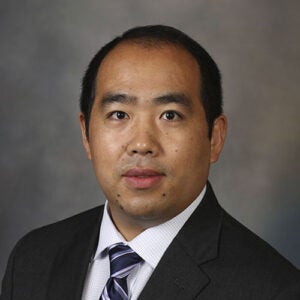
Jie Sun, PhD
Harrison Distinguished Teaching Professor Jie Sun, PhD, in the Department of Medicine’s Division of Infectious Diseases and International Health and the Beirne B. Carter Center for Immunology Research, was awarded a $3.1 million grant from the National Institutes of Health for a project titled “CD38, T cells and post viral lung sequelae during aging.”
Respiratory viruses such as influenza and SARS-CoV-2 (the virus causing COVID-19) are great public health challenges and can lead to severe host diseases, particularly in older adults. In some cases, these infections cause long-term damage that persists well after the initial illness, including persistent lung fibrosis and other chronic respiratory conditions. Unfortunately, there are currently no treatments to prevent or reverse these lasting effects following an acute viral infection.
Dr. Sun’s new research aims to uncover how a specialized type of immune cells, known as tissue-resident memory T cells, contribute to this ongoing damage in the lungs. While these cells normally help protect against infections, they may become overly active in older individuals, driving chronic inflammation and scarring.
The Sun Lab has identified the molecule CD38 as a key factor that supports the function and survival of these T cells. By understanding how CD38 fuels these cells and by testing interventions that block CD38 activity, the team hopes to find innovative ways to minimize or even prevent chronic lung damage following severe influenza or COVID-19. Ultimately, their work could lead to therapies that support full recovery and prevent long-term health problems after such infections, particularly in the elderly.
Collaborators on the project include Chongzhi Zang, PhD, in the Department of Genome Sciences at UVA School of Medicine and Eduardo Chini, MD, PhD, at the Mayo Clinic.
Learn more about the Sun Lab, which focuses on immune mechanisms during infection, cancer, and aging.
Filed Under: Research
